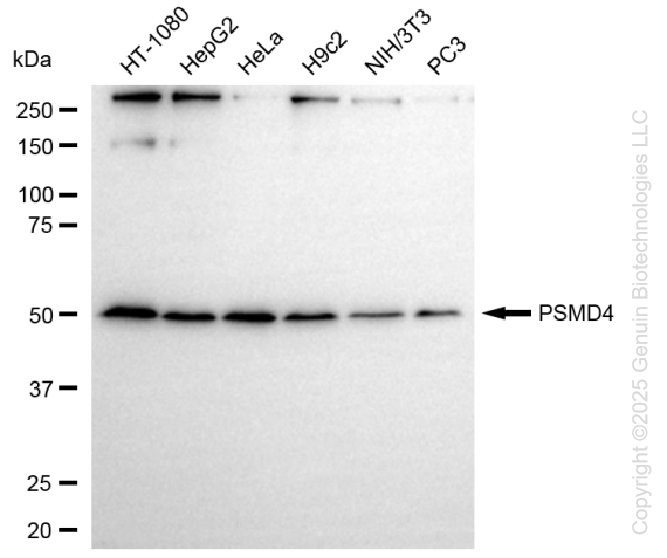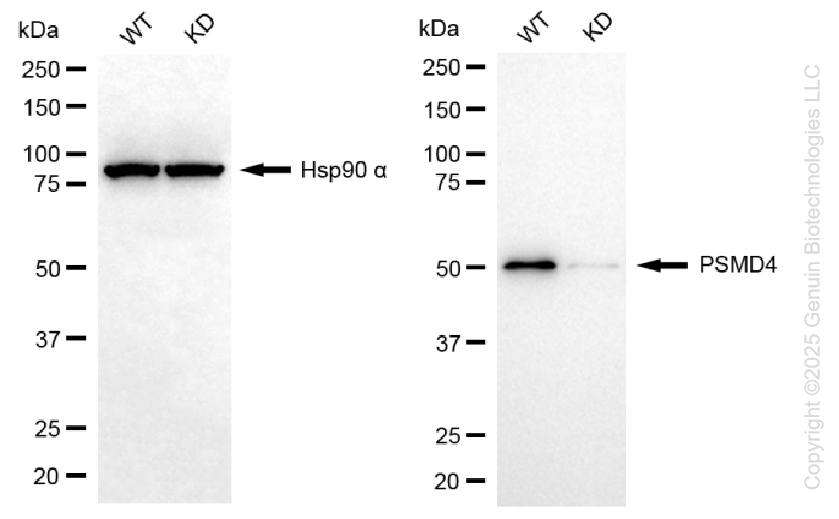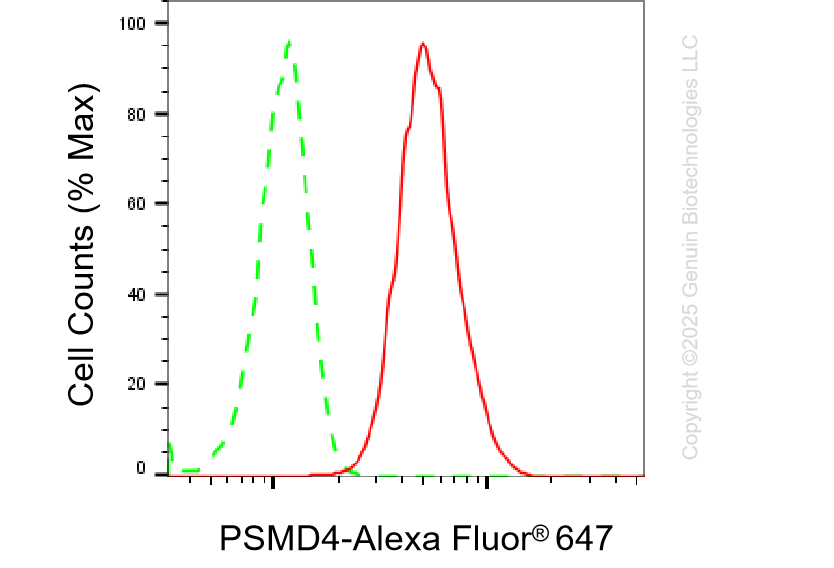KD-Validated Anti-PSMD4 Rabbit Monoclonal Antibody
Rabbit monoclonal antibody
- SPECIFICATION
- CITATIONS
- PROTOCOLS
- BACKGROUND

Application
| WB, FC |
|---|---|
| Primary Accession | P55036 |
| Reactivity | Rat, Human, Mouse |
| Clonality | Monoclonal |
| Isotype | Rabbit IgG |
| Clone Names | 25GB3365 |
| Calculated MW | Predicted, 41 kDa; observed, 50 kDa |
| Gene Name | PSMD4 |
| Aliases | PSMD4; Proteasome 26S Subunit Ubiquitin Receptor, Non-ATPase 4; AF; Rpn10; AF-1; S5A; Proteasome (Prosome, Macropain) 26S Subunit, Non-ATPase, 4; 26S Proteasome Non-ATPase Regulatory Subunit 4; 26S Proteasome Regulatory Subunit S5A; Proteasome 26S Subunit, Non-ATPase 4; Multiubiquitin Chain-Binding Protein; Antisecretory Factor 1; MCB1; ASF; 26S Proteasome Regulatory Subunit RPN10; S5a/Antisecretory Factor Protein; Angiocidin; PUB-R5 |
| Immunogen | A synthesized peptide derived from human PSMD4 |
| Gene ID | 5710 |
|---|---|
| Other Names | 26S proteasome non-ATPase regulatory subunit 4, 26S proteasome regulatory subunit RPN10, 26S proteasome regulatory subunit S5A, Antisecretory factor 1, AF, ASF, Multiubiquitin chain-binding protein, PSMD4, MCB1 |
| Name | PSMD4 |
|---|---|
| Synonyms | MCB1 |
| Function | Component of the 26S proteasome, a multiprotein complex involved in the ATP-dependent degradation of ubiquitinated proteins. This complex plays a key role in the maintenance of protein homeostasis by removing misfolded or damaged proteins, which could impair cellular functions, and by removing proteins whose functions are no longer required. Therefore, the proteasome participates in numerous cellular processes, including cell cycle progression, apoptosis, or DNA damage repair. PSMD4 acts as an ubiquitin receptor subunit through ubiquitin- interacting motifs and selects ubiquitin-conjugates for destruction. Displays a preferred selectivity for longer polyubiquitin chains. |

Thousands of laboratories across the world have published research that depended on the performance of antibodies from Abcepta to advance their research. Check out links to articles that cite our products in major peer-reviewed journals, organized by research category.
info@abcepta.com, and receive a free "I Love Antibodies" mug.
Provided below are standard protocols that you may find useful for product applications.
If you have used an Abcepta product and would like to share how it has performed, please click on the "Submit Review" button and provide the requested information. Our staff will examine and post your review and contact you if needed.
If you have any additional inquiries please email technical services at tech@abcepta.com.














 Foundational characteristics of cancer include proliferation, angiogenesis, migration, evasion of apoptosis, and cellular immortality. Find key markers for these cellular processes and antibodies to detect them.
Foundational characteristics of cancer include proliferation, angiogenesis, migration, evasion of apoptosis, and cellular immortality. Find key markers for these cellular processes and antibodies to detect them. The SUMOplot™ Analysis Program predicts and scores sumoylation sites in your protein. SUMOylation is a post-translational modification involved in various cellular processes, such as nuclear-cytosolic transport, transcriptional regulation, apoptosis, protein stability, response to stress, and progression through the cell cycle.
The SUMOplot™ Analysis Program predicts and scores sumoylation sites in your protein. SUMOylation is a post-translational modification involved in various cellular processes, such as nuclear-cytosolic transport, transcriptional regulation, apoptosis, protein stability, response to stress, and progression through the cell cycle. The Autophagy Receptor Motif Plotter predicts and scores autophagy receptor binding sites in your protein. Identifying proteins connected to this pathway is critical to understanding the role of autophagy in physiological as well as pathological processes such as development, differentiation, neurodegenerative diseases, stress, infection, and cancer.
The Autophagy Receptor Motif Plotter predicts and scores autophagy receptor binding sites in your protein. Identifying proteins connected to this pathway is critical to understanding the role of autophagy in physiological as well as pathological processes such as development, differentiation, neurodegenerative diseases, stress, infection, and cancer.




